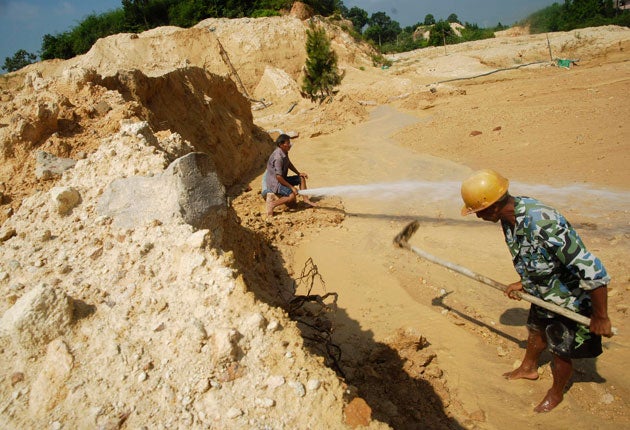Rare-earth metal prices spike as China stockpiles supplies

Prices for rare-earth metals, which are used in everything from iPods to flat-screen TVs to missiles, are rising sharply as China builds up a stockpile and cuts quotas, so much so that some industries fear global supplies may be in serious jeopardy.
Rare-earth metals are among some of the most sought-after materials in modern manufacturing, and demand for at least some of them is soon set to outstrip supply.
Japan and the US, the world's biggest importers of rare earths, are concerned that China, which produces more than 95 per cent of the world's supply is trying to limit supplies, and urged Beijing not to use the elements as a trade weapon.
Citing the need for a more sustainable approach to the harvesting of its rare-earth deposits, China's cabinet, the State Council, has authorised a crackdown on unregulated rare-earth mining and has introduced restrictions on exports, causing a spike in rare-earth prices. It is also building up a national reserve of the precious elements.
"These policies are in line with common international practices and the rules of the World Trade Organisation. They have been created out of a sense of responsibility not only for China's own development, but also the development of the world," China's Ministry of Industry and Information Technology told the Xinhua news agency.
Rare earths are used in all kinds of modern products because their unique electrical, magnetic, optical and thermal properties make them vital ingredients for some of the most technologically advanced products.
The cost of some of the 17 elements that make up the rare-earth metals has doubled in the last few weeks, with the price of others up by 400 or 500 per cent from the start of the year. Since last year, big government groups like Baotou Iron and Steel have been building up commercial reserves with total capacity of more than 200,000 tonnes, around twice China's annual output, according to Chinese media reports.
Beijing has brought 11 rare-earth mines under state control as it consolidates the industry. Last year, Japan was furious when China slashed exports by 40 per cent and temporarily banned all supplies, after a Chinese fishing boat captain was arrested for sailing too near to a disputed island chain.
China also needs to move quickly on these elements because they are running out fast. The Ministry of Commerce said that between January and November last year, China exported 35,000 tons of rare earth, up 14.5 per cent on 2009. At current rates of depletion, a third of China's rare earths are already used up. There is probably around 15 years worth left at the current rate.
To capitalise on its stocks, China has introduced quotas in recent years, which have cut exports by between five and 12 per cent a year.
There is a strong political dimension to the quotas, but they were also introduced because China is worried about the environmental impact of the mining.
Ceng Qingshou, an elderly rice farmer living in the Guangxi Zhuang region in southwest China, told Xinhua how his rice fields had been contaminated by waste water from a quarry, killing the harvest.
"They paid me 2,400 yuan (£229) to compensate me for my losses last year, but what about this year, and the year after that?" he said.
In other areas rich in rare earths, such as Jiangxi province, rare-earth mines have poisoned wells, leading to anger among farmers.
"While many countries around the world are eager to develop their rare-earth mining industries, China just wants to clean up its act," wrote a Chinese industrial commentator.
Join our commenting forum
Join thought-provoking conversations, follow other Independent readers and see their replies
Comments